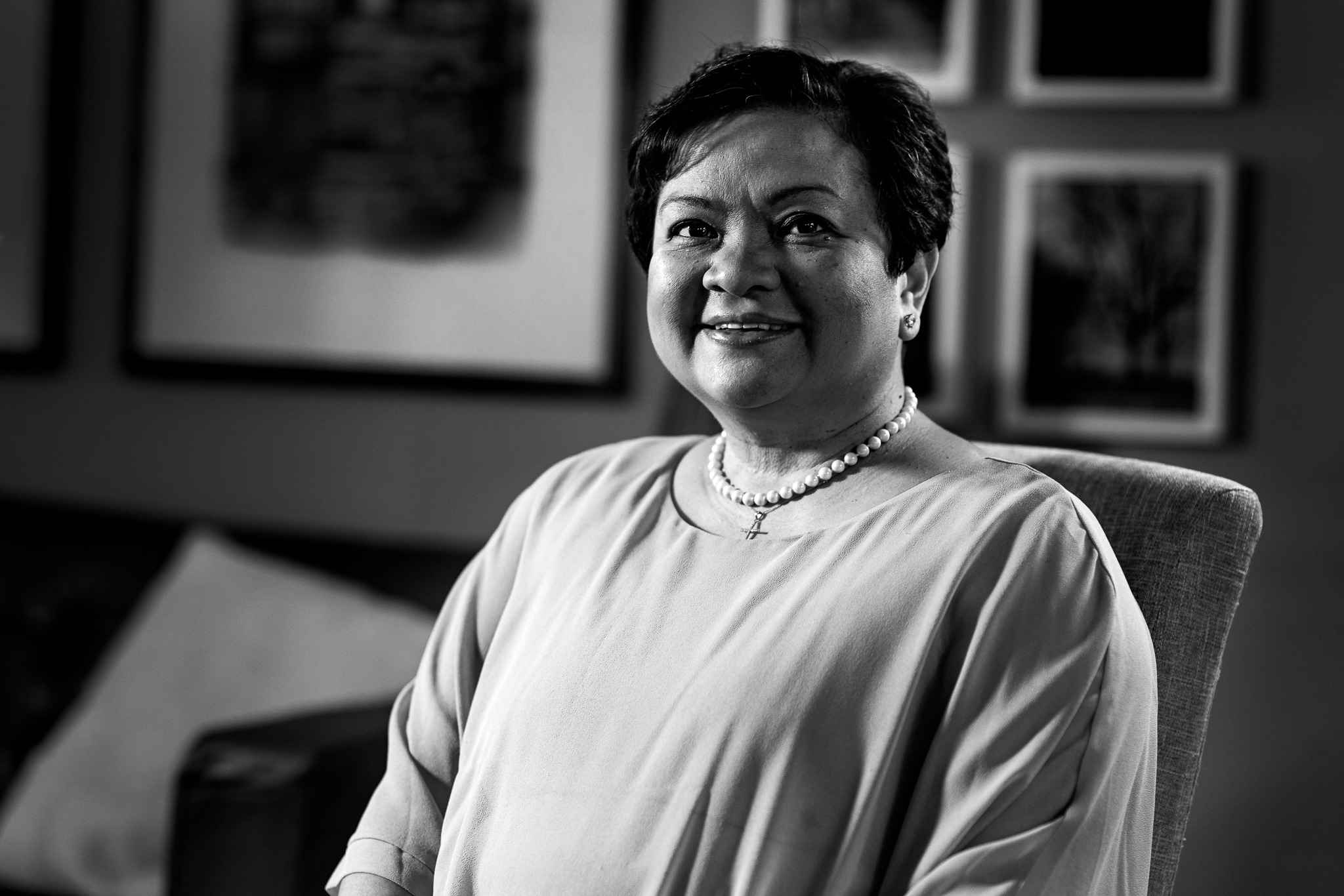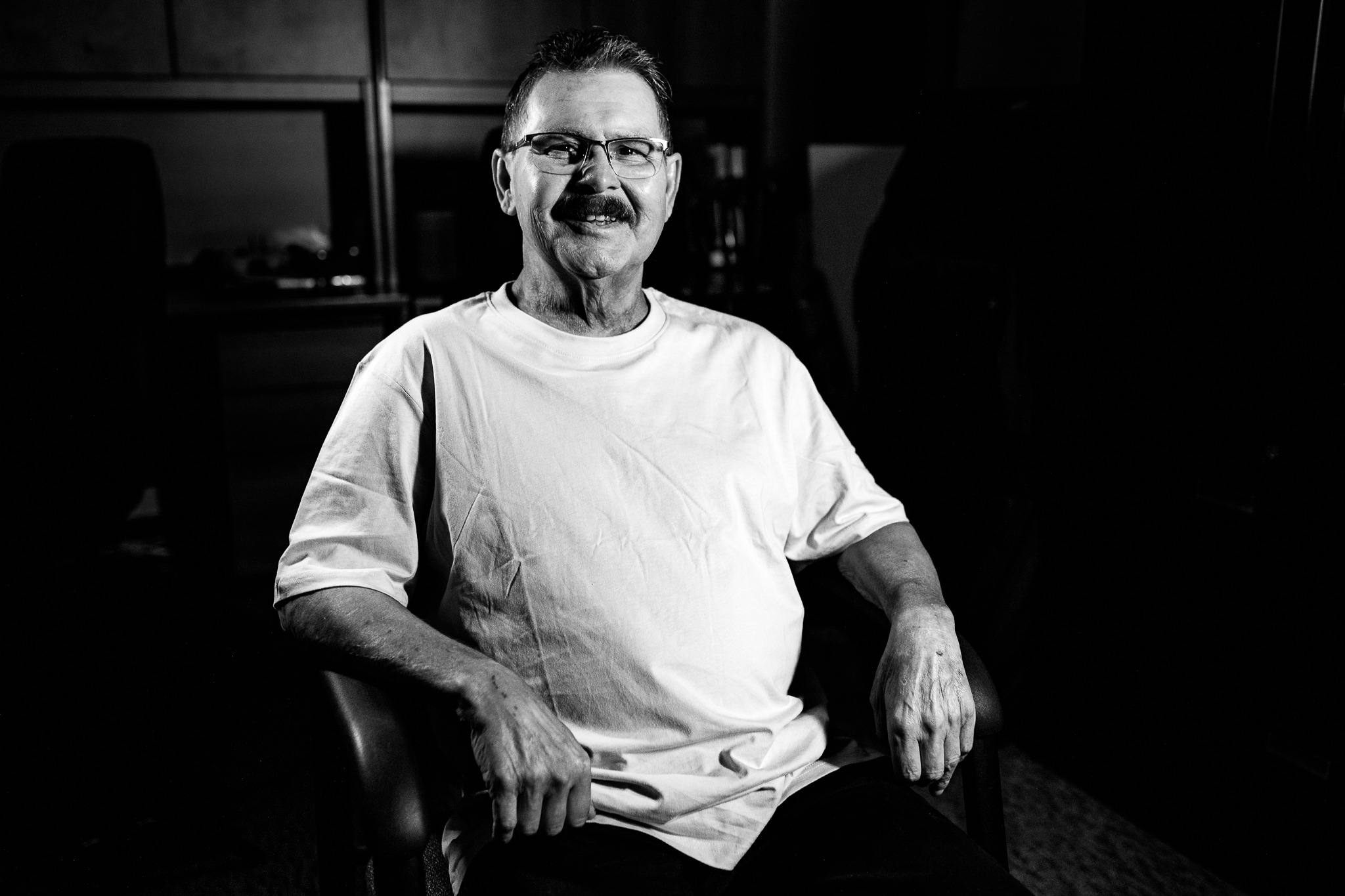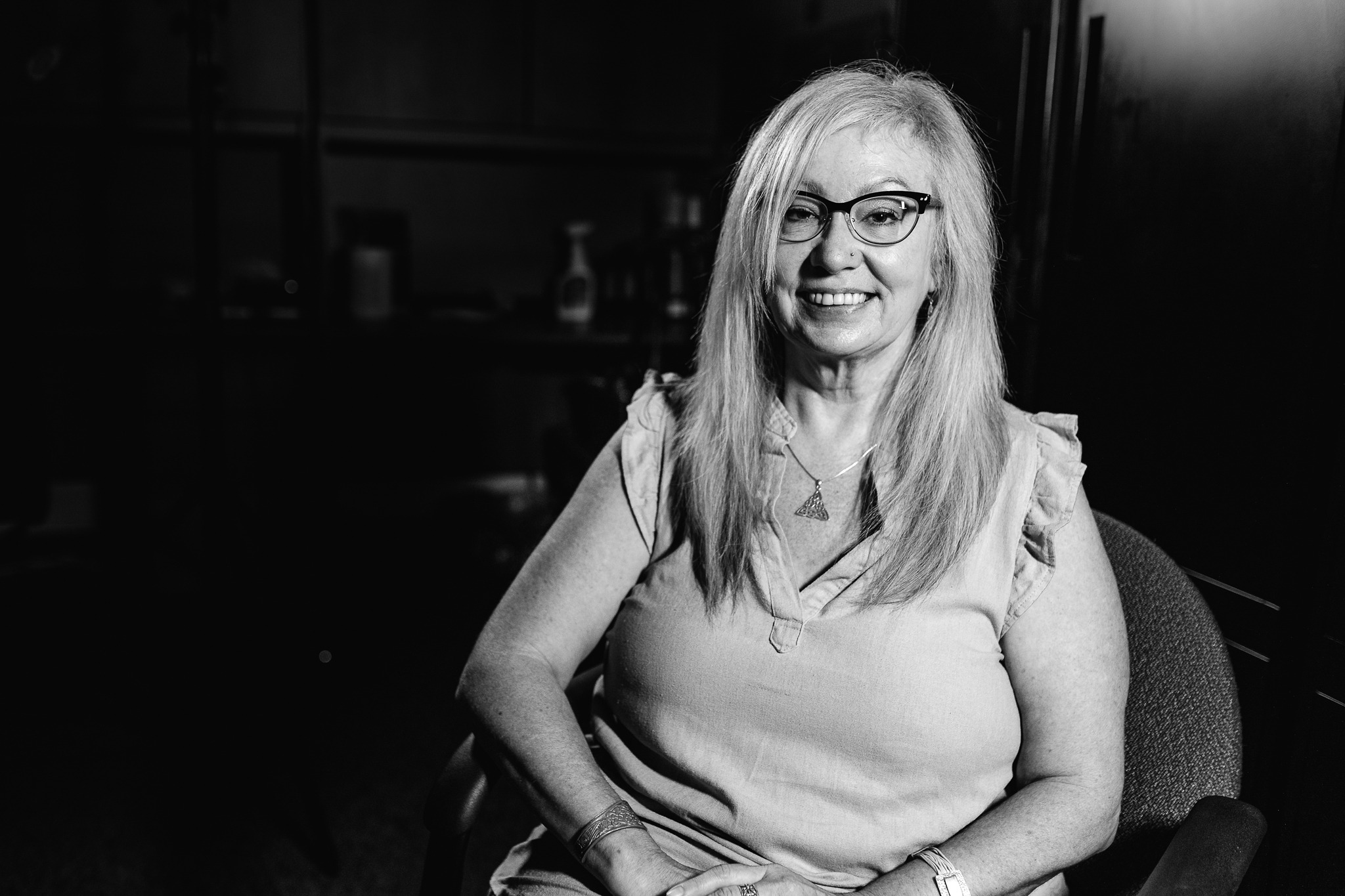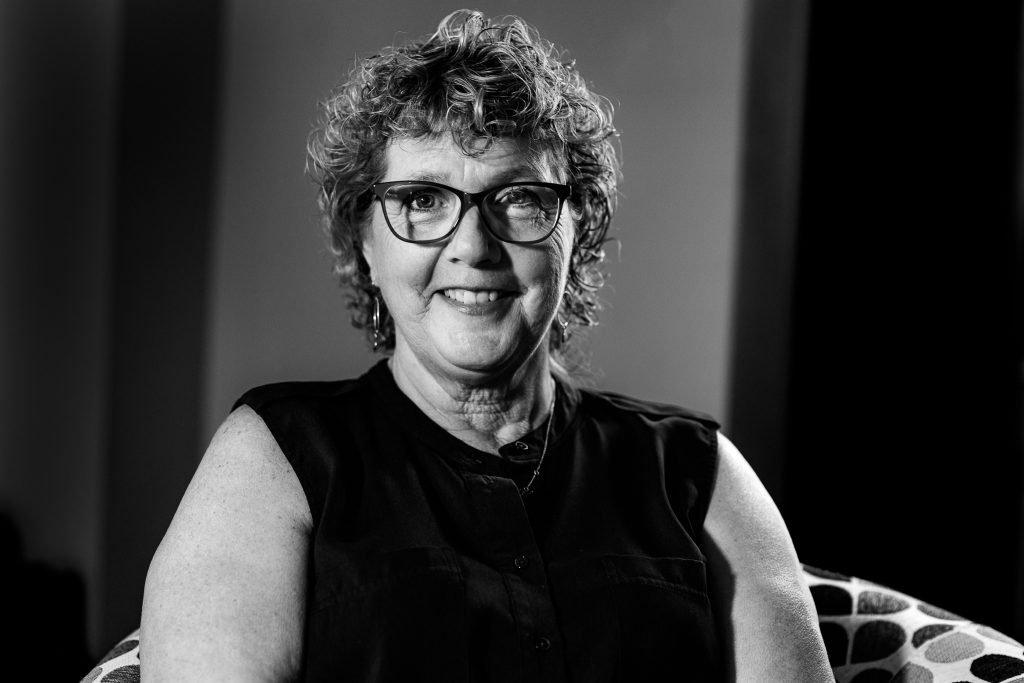
Leukemia diagnosis blindsides breast cancer survivor
“The care I received was excellent.”
Sharon Walker’s life was finally getting back to normal after being rocked by a breast cancer diagnosis in 2015.
An avid golfer, the Milton woman had returned to her favourite sport after undergoing chemotherapy, radiation and a double mastectomy. But just as she was feeling like herself again, new health concerns surfaced that would prove to have serious consequences for her future plans.
Spotlight on Sharon Walker, acute myeloid leukemia patient
In early 2021, Walker started feeling exhausted, lost her appetite and developed unexplained bruising. Tests at her local hospital in Halton led to a new cancer diagnosis – this time for acute myeloid leukemia (AML), a type of cancer that starts in the blood-forming cells of the bone marrow. She was referred to Hamilton Health Sciences (HHS) Juravinski Hospital and Cancer Centre (JHCC) for treatment that included chemotherapy and a stem cell transplant.
“I thought I was on the other side of cancer, and then ‘bam,’ I was blindsided with this diagnosis,” says Walker, 61. “It hasn’t been easy, that’s for sure, but I’m very grateful for the care I’ve received.”
“The care I received was excellent. Everything happened so seamlessly, and I never felt like I was alone.” — Sharon Walker, patient
This was Walker’s first experience at JHCC, since her breast cancer was diagnosed and treated at hospitals in Halton and Peel.
Life-changing cancer care
Juravinski Hospital and Cancer Centre is the only hospital in the region where patients can be treated for all forms of cancer, with its staff and doctors supporting more than 26,000 cancer patients each year.
“You can’t overstate the thankfulness you feel.” — Sharon Walker, acute myeloid leukemia patient
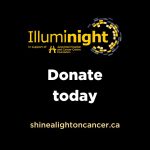 It’s one of just three centres in the province providing all forms of stem cell transplants to adult cancer patients. In 2020, its hematology department expanded with the opening of the Ron and Nancy Clark Stem Cell Transplantation and Cellular Therapies Unit for patients needing treatment for blood cancers. It was named after the late Ron Clark and his wife Nancy Clark of Caledonia, in recognition of their more than $1 million gift to the project.
It’s one of just three centres in the province providing all forms of stem cell transplants to adult cancer patients. In 2020, its hematology department expanded with the opening of the Ron and Nancy Clark Stem Cell Transplantation and Cellular Therapies Unit for patients needing treatment for blood cancers. It was named after the late Ron Clark and his wife Nancy Clark of Caledonia, in recognition of their more than $1 million gift to the project.
“I was drawn to HHS because it’s a top hospital in Canada for hematology, with one of the largest hematology divisions in the country.” Dr. Kylie Lepic.
The new unit builds on HHS’ expertise in the field of blood cancer treatment, allowing the cancer program to increase capacity for patients requiring allogeneic and autologous transplants. An allogeneic transplant, which Walker received, refers to stem cells from a donor. An autologous transplant is when a patient’s own stem cells are used. The new unit also advances HHS’ abilities to provide CAR T-cell therapy, which is a way to get immune cells called T cells to fight cancer by changing them in the lab so they can find and destroy cancer cells.
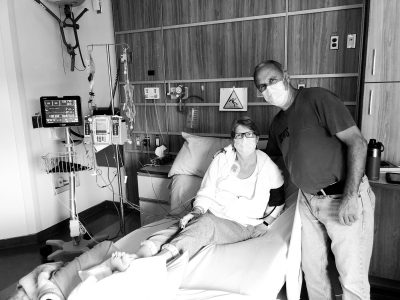
Sharon Walker spent eight weeks in hospital leading up to her stem cell transplant. She’s pictured here with her husband Kevin.
Walker spent eight weeks in the new unit, receiving chemotherapy treatment aimed at knocking the cancer into remission in preparation for her stem cell transplant.
“It was a long stay, and the nurses were all overworked because of the pandemic, but they always took the time to talk to me and make a connection with me,” says Walker. “The care I received was excellent. Everything happened so seamlessly, and I never felt like I was alone.”
Meanwhile, the search was on for a donor. Walker’s closest blood relatives – her three daughters and five siblings — were tested but none were a good match. Through JHCC’s transplant coordination team, Walker joined the Canadian Blood Services Stem Cell Registry which conducts national and international searches for unrelated donors on behalf of patients in Canada.
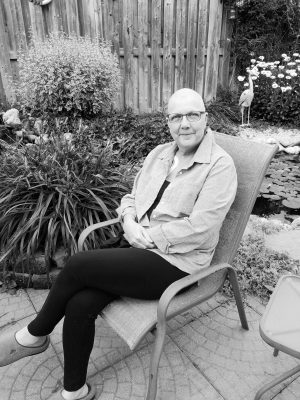
Sharon Walker, recovering at home
Three excellent candidates were found, and the one selected was a 28-year-old woman. The donation process is anonymous, but Walker hopes to someday meet the donor who helped saved her life. “I want to say thank you in person for her kind and selfless act.”
Walker’s stem cell transplant took place in June 2021. She feels almost back to normal now, and has even played some golf, though she tires easily.
“I feel so blessed to have a facility like Juravinski Hospital and Cancer Centre so close by,” says Walker. “Everyone who cared for me — from the doctors, to nurses, to the social workers, dietitians pharmacists and the transplant team — were exceptional.”
Walker is especially grateful for her HHS hematologist, Dr. Kylie Lepic. ”I continue to see Dr. Lepic every three months for follow-ups,” says Walker. “She’s so compassionate, caring and extremely informative. I’m in amazing hands, and I’ve felt that from the get-go.”
Spotlight on Dr. Kylie Lepic, hematologist and medical director of JHCC’s cellular therapy and transplant program
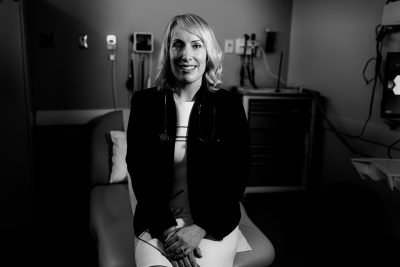
Building relationships with patients, doctors and staff is among the aspects of Lepic’s work that she loves best.
“I really enjoy working in a field that’s scientifically and academically fascinating, but also allows me to develop a wonderful rapport with colleagues and patients who inspire me every day,” she says.
Lepic was a McMaster University medical school student who trained at HHS and in the United States before joining the hospital system as a hematologist.
“I was drawn to HHS because it’s a top hospital in Canada for hematology, with one of the largest hematology divisions in the country,” says Lepic. “Hamilton is also a national leader in terms of stem cell transplants and cellular therapy.”
The first unrelated stem cell transplant in the country took place at HHS.
“We were also among the first centres in the country offering haploidentical (half-match) transplant, where healthy blood-forming cells from a half-matched donor are used for patients who do not have a fully matched donor,” says Lepic. “And we were the first English-speaking hospital in the country to offer adult CAR T-cell therapy. It’s inspiring to work at a leading Canadian hospital with such a strong reputation of innovation and excellence.”
Spotlight on Samantha Dykstra, registered nurse and allogeneic nurse transplant coordinator
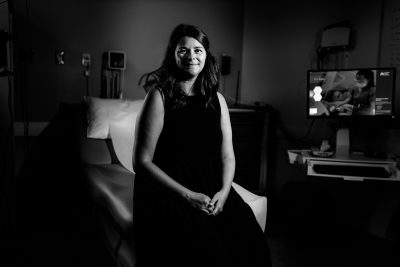
Samantha Dykstra was the transplant coordinator who led the unrelated donor search for Walker’s donor.
“As well as finding my match, Sam explained what to expect in the weeks leading up to the transplant,” says Walker. “She was very knowledgeable, and wonderful to work with.”
“It’s a privilege and an honour to support our patients during this challenging time in their lives.” — Samantha Dykstra, transplant coordinator
Finding matches is highly rewarding work, says Dykstra, who joined the hematology department 15 years ago as a newly graduated registered nurse. Through a grant from Hamilton Health Sciences Foundation, she took part in an internship that trained her for her permanent role as a nurse transplant coordinator.
Foundation support also allowed for the training of staff to provide specialized care for transplant patients, says Dykstra, adding that she and her coworkers are currently taking a course, thanks to hospital donations, that’s helping them hone their skills in locating difficult-to-find matches.
“Finding good donor matches is very exciting and rewarding, because it means we’re giving our patients a new chance at life,” says Dykstra. “Our team is here to support our patients on their journey and we celebrate their successes and satisfaction with our care. It’s a privilege and an honour to support our patients during this challenging time in their lives.”
Illuminight: Help shine a light on blood cancer
Illuminight is an annual fundraising event that aims to shine a light on the nationally-leading, life-saving cancer care and research at JHCC. This year, we’re celebrating Illuminight with a five-part series of stories and videos from Sept. 22 to Oct. 11 featuring gynecologic, blood and hepato-pancreato-biliary (HPB) cancer care as well as cancer research and health equity.
Look for:
Thursday, Sept. 29: Well-oiled cancer care `machine’ gives Hamilton man quality of life
Tuesday, Oct. 4: Partnering for equitable, high-quality cancer care
Tuesday, Oct. 11: Lung cancer research and treatment working wonders
Since 2018, Illuminight has raised more than $500,000 to support the highest priority needs of the cancer program at Juravinski Hospital and Cancer Centre. Help us shine a light on cancer and donate today.

